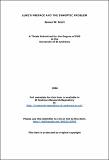Luke's preface and the synoptic problem
Abstract
The preface to Luke's gospel (Lk. 1:1-4), when properly exegeted, says this: "(1) Since many have undertaken to draw up a narrative account of the things that are well-established among us, (2) just as those who from the beginning have been eyewitnesses and servants of the word have handed them down to us, (3) I have decided, for my part, having been a follower of them all for a long time, to write an accurate narrative for you, most excellent Theophilus, (4) in order that you may know what is certain with regard to the matters in which you have been instructed." Luke's claim to have been a follower of the apostles (vs. 3), and thus conversant with their oral gospel tradition (vs. 2), is confirmed by an ecclesiastical tradition that can be traced back to one of those very apostles, Luke implies that he did not use written sources in the composition of his gospel, for unlike ancient historians who did use written sources, he does not acknowledge any use of his predecessors' narratives. In writing "an accurate narrative" he would not have relied upon what he considered to be the inaccurate narratives of his predecessors. Luke indicates that his gospel records the oral tradition that he has learned directly from the apostles. The leading theories of synoptic origins tend to collapse into an oral theory under the weight of Luke's literary independence. The arguments hitherto advanced against the oral theory are inadequate. The oral tradition consisted of a basic narrative tradition (which is reconstructed) and a body of independent tradition. Luke and Matthew drew upon both traditions, but Hark confined himself to the former. Our two-tradition theory is corroborated, especially in comparison with the standard two-source theory, try various literary and stylistic phenomena.
Type
Thesis, PhD Doctor of Philosophy
Collections
Items in the St Andrews Research Repository are protected by copyright, with all rights reserved, unless otherwise indicated.

